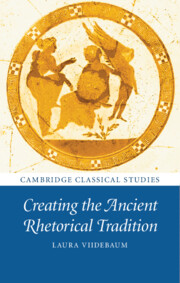Refine search
Actions for selected content:
4 results
Chapter 2 - The Relationship of the Unmoved Mover and the Self-Mover
-
- Book:
- Proclus on Aristotle on Plato
- Published online:
- 05 June 2025
- Print publication:
- 19 June 2025, pp 67-98
-
- Chapter
-
- You have access
- Open access
- HTML
- Export citation
2 - Reflections on Lysias and Lysianic Rhetoric in the Fourth Century BCE
- from Part I - Lysias, Isocrates and Plato: Ancient Rhetoric in Athens
-
- Book:
- Creating the Ancient Rhetorical Tradition
- Published online:
- 03 November 2021
- Print publication:
- 18 November 2021, pp 32-61
-
- Chapter
-
- You have access
- Open access
- HTML
- Export citation
Introduction
-
- Book:
- Creating the Ancient Rhetorical Tradition
- Published online:
- 03 November 2021
- Print publication:
- 18 November 2021, pp 1-16
-
- Chapter
-
- You have access
- Open access
- HTML
- Export citation

Creating the Ancient Rhetorical Tradition
-
- Published online:
- 03 November 2021
- Print publication:
- 18 November 2021
-
- Book
-
- You have access
- Open access
- Export citation
